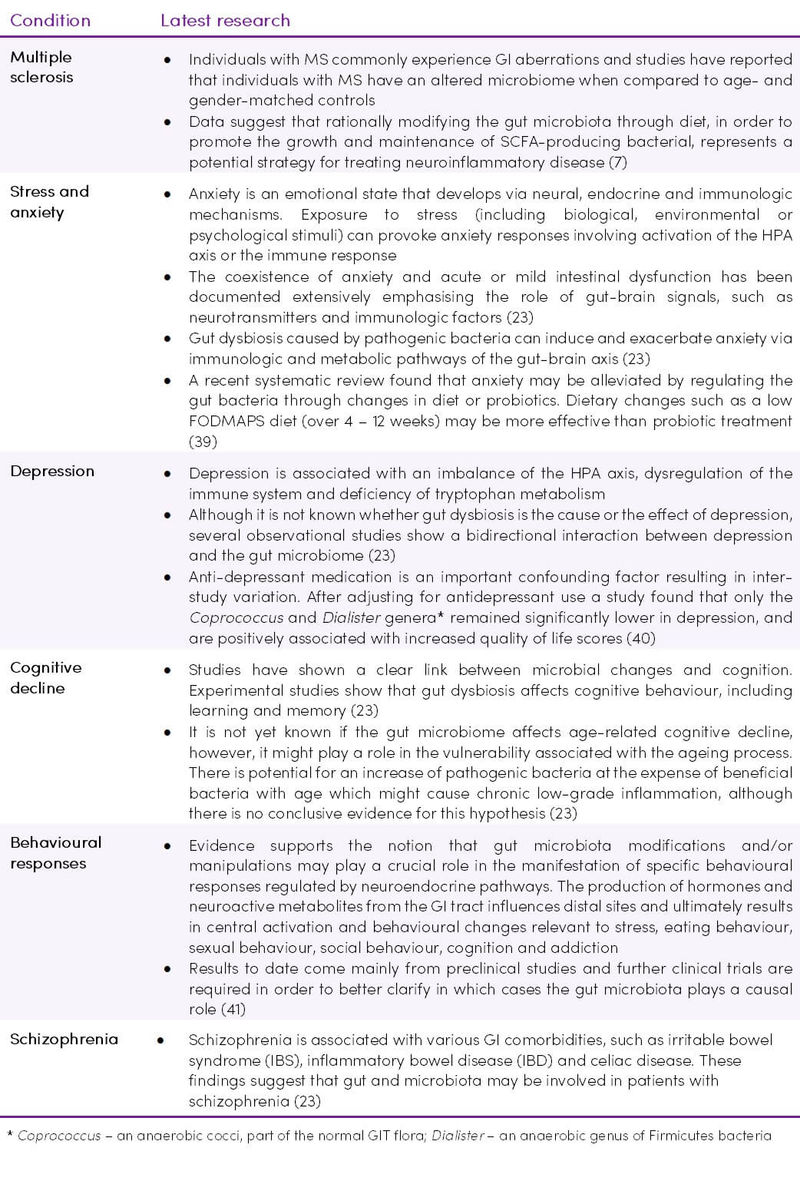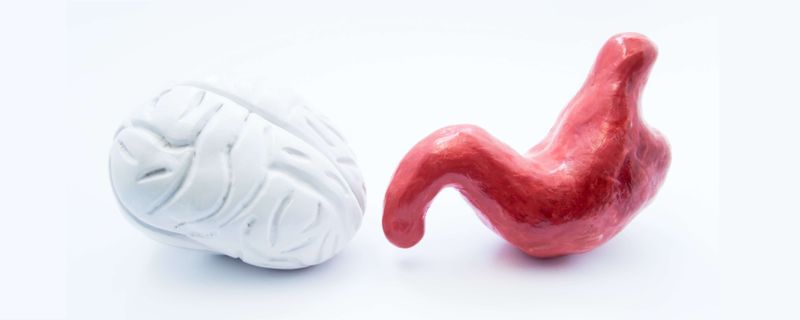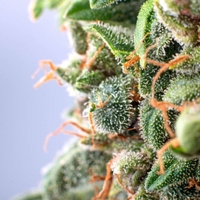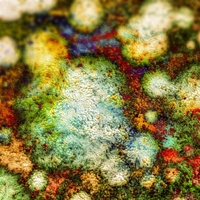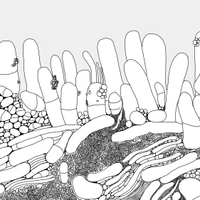Gut-brain Axis
The gut microbiota consists of a diverse community of bacterial species in the gastrointestinal (GI) tract which exists symbiotically with the human host. A healthy and stable gut microbiota community plays a vital role in maintaining motility, permeability, secretion and immunity of the gut. In recent years, the gut microbiome has also been associated with many psychiatric and neurodevelopmental disorders via a system known as the gut-brain axis (Table 1).
Table 1. Conditions influenced by the gut-brain axis (1,2,3,4)
.jpg) The gut-brain axis incorporates the central nervous system (CNS), autonomic nervous system (ANS) and enteric nervous system (ENS) in addition to the neuroendocrine and the neuroimmune systems.
The gut-brain axis incorporates the central nervous system (CNS), autonomic nervous system (ANS) and enteric nervous system (ENS) in addition to the neuroendocrine and the neuroimmune systems.
The gut microbiome communicates via multiple pathways, including (1,4):
- vagus nerve
- neurotransmitters (e.g. serotonin)
- immune system
- hormonal system
- bacterial metabolites such as short-chain fatty acids (SCFAs)
Figure 1. A systems model of brain-gut-microbiome interactions (5) CC BY-NC-ND 4.0
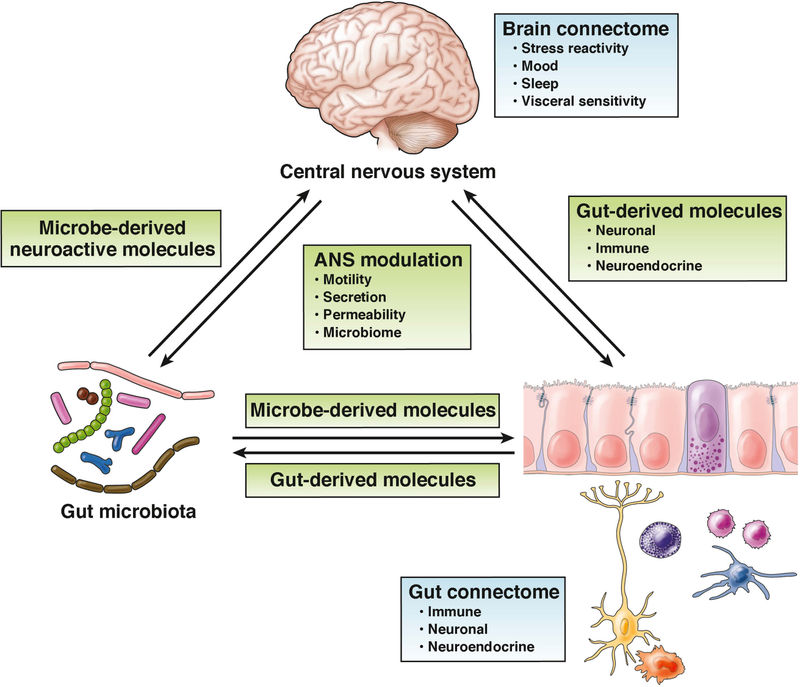
The communication between the CNS and the GI tract is bidirectional and is responsible for the modulation of digestive processes, immune function and responses to visceral stimuli. Disturbance of these pathways results in disruption to neurotransmitter balance, increases in chronic inflammation or exacerbated hypothalamic-pituitary-adrenal (HPA) axis activity (2,6).
The trigger that causes blood-brain barrier leakage, immune cell activation and inflammation, and ultimately neuroinflammation in the CNS is believed to be due to disturbance of the microbiome-gut-axis (2,4). An imbalance of the gut microbiota results in dysbiosis and disruption of the gut microbiota homeostasis. Signalling between the gut-brain axis is also impacted potentially leading to neurological and neuroimmune abnormalities. Dysbiosis is commonly associated with a compromised gut epithelium, and the subsequent bacterial translocation (‘leaky-gut’) may result in innate immune activation and systemic inflammation which can promote neuroinflammation across the blood-brain barrier (7).
Figure 2. Key communication pathways of the microbiota-gut-brain axis (8) CC BY-NC-ND 4.0
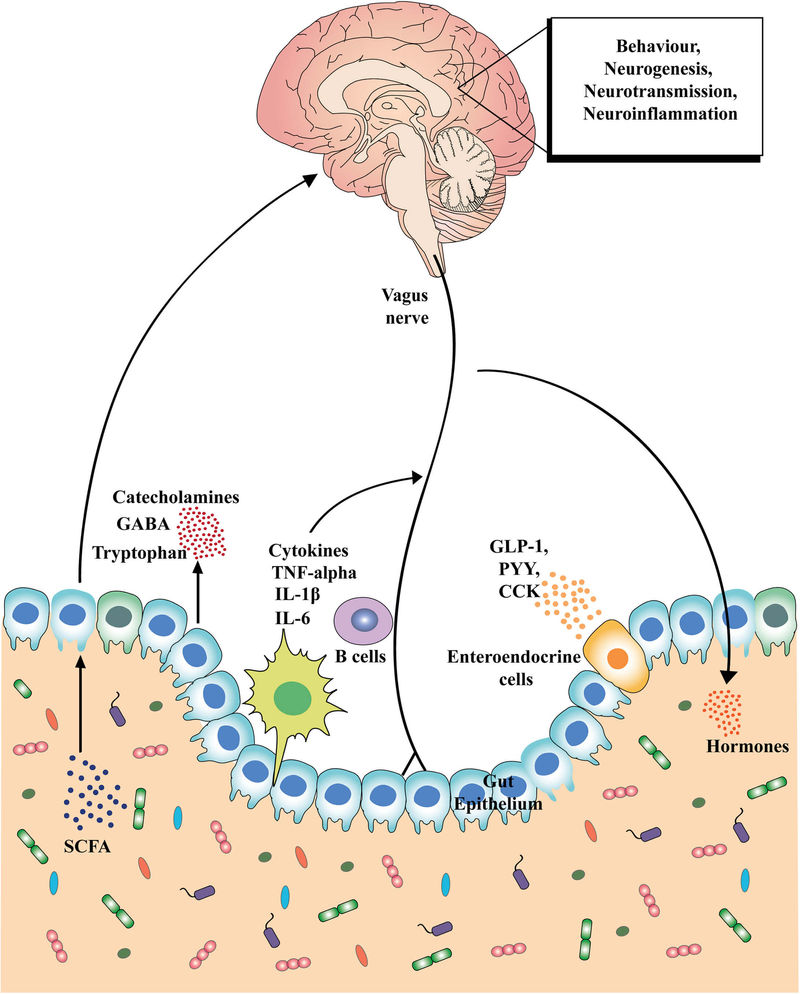
Traditional Understanding
Historically, the microbiota was known to consist of commensal bacteria that do not harm the host nor necessarily impart any significant benefit. The exception was the knowledge based on observations that commensal bacteria compete with pathogenic species for nutrients and sites for colonization and, therefore, a compromised gut microbiota can lead to pathogenic intestinal infection (7). More recently the microbiome has been associated with gut functions and gut barrier integrity. Neurological and psychological conditions were assumed to be related to dysfunction in brain and neurotransmitter processes. The revelation of the bidirectional communication between the brain and the gut microbiome is helping to solve many unanswered questions about the aetiology and the possible treatment of both neurological, psychological and GIT conditions.
Latest Research
Recent studies have shown that the gut microbiota is involved in neurodevelopment and diverse brain functions by regulating the gut-brain axis. GI symptoms, such as constipation, diarrhoea, and abdominal pain are common comorbidities in many neurological diseases. In addition, dysregulation in the composition of gut microbiota (gut dysbiosis) is present in a variety of neurological diseases. Therefore, the importance of maintaining a healthy microbiota community (gut symbiosis) in the regulation of the gut-brain axis is of utmost importance. For example, certain species of Bifidobacterium, which are decreased in Alzheimer’s Disease (AD), are associated with anti-inflammatory properties and decreased intestinal permeability. Similarly, gram-negative intestinal bacteria of Bacteroides, which are increased in patients with AD, may result in increased translocation of lipopolysaccharides (LPS) from the gut to the systemic circulation, which in turn may contribute to or exacerbate AD pathology through neuroinflammation (9).
Bacteria have been shown to produce and/or consume a wide range of neurotransmitters, including dopamine, norepinephrine, serotonin and or gamma-aminobutyric acid (GABA). Accumulating preclinical evidence suggests that manipulation of these neurotransmitters by bacteria may have an impact in host physiology, and preliminary human studies are showing that microbiota-based interventions can also alter neurotransmitter levels (10).
The term microbiota-gut-brain axis has been introduced to highlight the role of the microbiota in the gut-brain axis (11).
Parkinson's Disease
Growing evidence shows that alterations in gut microbiota composition and microbial metabolites may be involved in the pathogenesis and clinical phenotype of Parkinson's disease (PD) (12,13).
- PD is a neurodegenerative disorder that affects predominately dopamine-producing (‘dopaminergic’) neurons. Dopamine synthesis in the brain is induced by dopamine-producing enzymes that are controlled by gut microbiota (14).
- The prevalence of small intestinal bacterial overgrowth (SIBO) is 25-54% in PD patients compared to 8-20% in normal controls and has been associated with a greater degree of impairment in motor control in PD (15).
- Early involvement of GI dysfunction is considered a possible pre-symptomatic stage of PD making the gut microbiota a promising source of information for diagnosis, prognosis, and, potentially, pathogenesis (4,5). The risk of PD development increases with infrequency of bowel movement and constipation severity, and there is a significant comorbidity of PD and IBS-like symptoms (16).
- The manipulation of gut microbiota and microbial metabolites may have a positive impact on PD patients through a reduction in non-motor symptoms and potential stemming of classical motor symptoms. However, how the microbiota directly or indirectly exerts effects on brain neurons or immune cells, such as microglia and astrocytes in PD, has yet to be uncovered (4).
- To date, little is known about the molecular causes of altered gut homeostasis in PD. A reduction in the level of neurotrophins, including brain-derived neurotrophic factor (BDNF), may contribute to deregulated gut homeostasis and constipation in PD (7).
Figure 3. Possible pathways involved in PD pathogenesis (17) CC BY 4.0
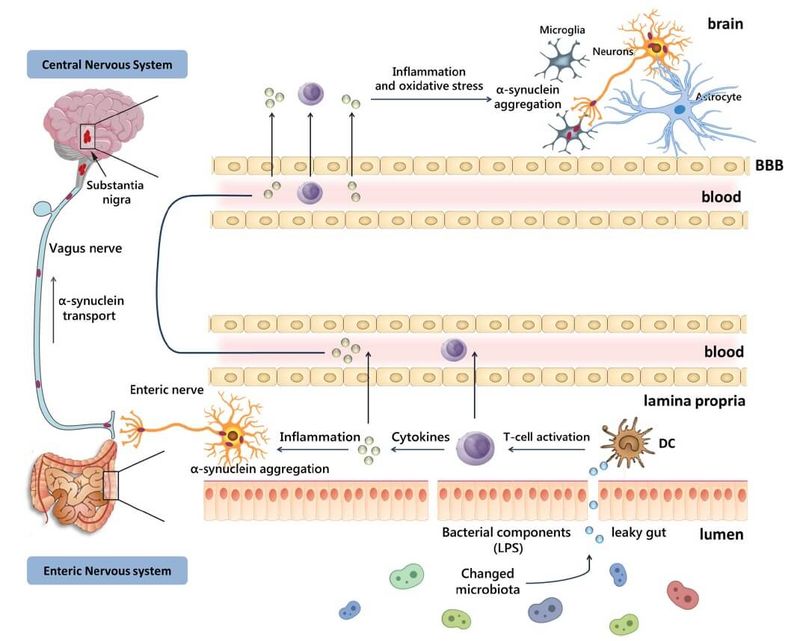
Alzheimer's Disease
Recent evidence suggests that alterations in the microbiome of those with Alzheimer’s disease (AD) may be associated with or contribute to the pathophysiology of AD (18,19,20).
- An association between an altered microbiome and the presentation of AD has been demonstrated in humans. The gut microbiome of AD cases contained less microbial diversity and was compositionally distinct from age-and sex-matched controls (9).
- A significant reduction in BDNF and of neuroprotective signalling is observed in post-mortem brain tissue as well as in vivo models of AD. This has been suggested to contribute to the overt and progressive neurodegeneration of hippocampal neurons (21). BDNF confers a neuroprotective role, and recent evidence shows that BDNF levels are regulated by the gut microbiome. A reduction in BDNF can also exacerbate oxidative stress and alter gut homeostasis in AD cases (7).
- The progression and presentation of AD may be modified through the modification of the microbiota. It has been suggested that AD pathology commences as early as 20 years prior to the manifestation of overt symptoms, therefore modifying AD progression after symptoms are manifest may be a challenge. It is possible that the greatest opportunities in modifying the microbiota will be in the proactive prevention of AD for those with a hereditary predisposition (7).
- Gut bacteria synthesize and release amyloid peptides and lipopolysaccharides, which in turn contribute to the regulation of signalling pathways and activate inflammatory signalling through the release of cytokines, with potential effects on the pathophysiological cascade of AD (22).
- An imbalance of the gut microbiota is closely related to other factors involved in the pathogenesis of AD, such as obesity and type 2 diabetes (23).
Although promising, this is an emerging field in neuroscience and the available evidence requires confirmation by further rigorous studies (22).
Figure 4. Gut microbiota dysbiosis and Alzheimer’s disease. Mechanism and potential therapeutic interventions. Adapted from (24) CC BY 4.0
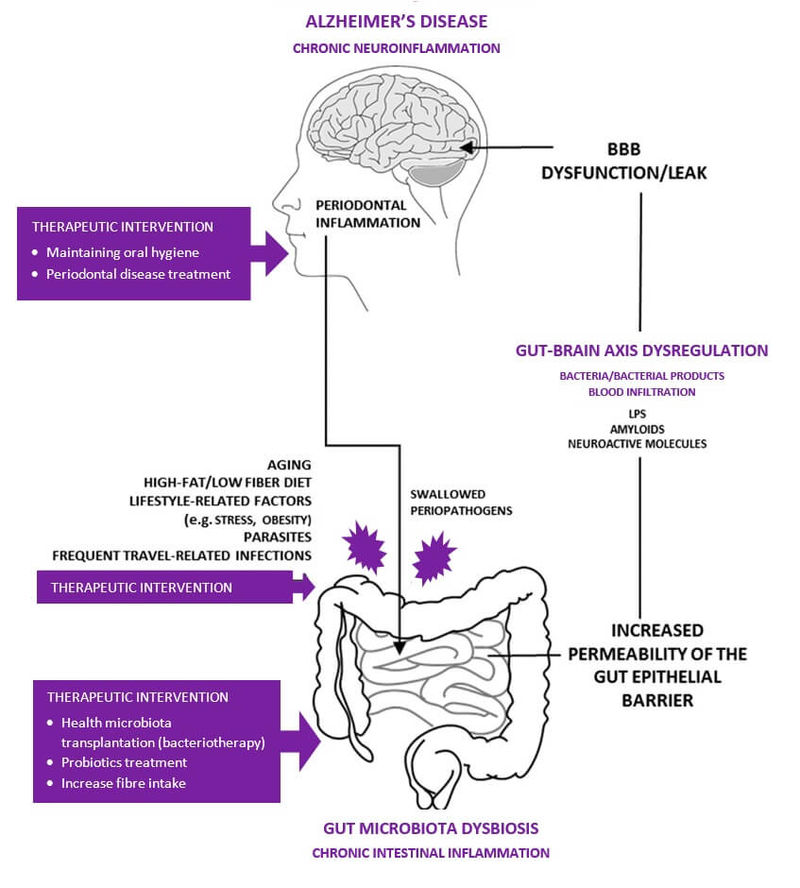
Autism Spectrum Disorder
As with other neurological disorders, such as PD and AD, GI dysfunction is among the most common medical co-morbidities associated with autism spectrum disorder (ASD), presenting with symptoms such as constipation, bloating and diarrhoea. Researchers have discovered that a gene mutation that affects neuron communication in the brain, the first identified as a cause of ASD, also causes dysfunction in the gut (25). A correlation has been found between GI dysfunction and the degree of social impairment in ASD. Studies have reported that ASD is often associated with an altered intestinal microbiome (26,27). Currently, however, there is no distinct microbiome profile characteristic of ASD or a specific profile that is associated with its neurobehavioral manifestations. Whether changes in the microbiome are caused by GI dysfunction or whether changes in the microbiome cause GI problems is still unclear (28). It should be noted that children with ASD are also characterized by alterations in the oral microbiome, raising the possibility that more than just the gut microbiota may be involved (29).
Alterations of the gut microbiome might promote the symptoms of ASD through microbial metabolites, immune regulation, HPA axis modulation and direct interaction with the brain (30).
- ASD-associated alterations in eating behaviour and diet are likely to play a role in altered intestinal microbiome composition (31)
- Compared with ASD-unaffected children, children with ASD and GI dysfunction have increased mucosal tissue levels of select microbial taxa, predominantly Clostridium, that correlate with cytokine and tryptophan homeostasis (32)
- A recent clinical trial investigating the potential benefits of a modified faecal transplantation therapy in children with ASD resulted in a significant improvement in GI symptoms (80% reduction) as well as behavioural symptoms, which were maintained at 8 weeks post-treatment. The treatment combined antibiotics, a bowel cleanse, a stomach-acid suppressant and FMT (33). A follow-up 2 years later found that GI improvements and increased gut microbiome diversity had been maintained. ASD related symptoms improved even more after the end of treatment. The proportion of children with severe symptoms dropped from 83% at baseline to 17% at the two-year follow-up, while 44% had dropped below the diagnostic cut-off score (34)
- Accumulating evidence demonstrates the beneficial effects of probiotics treatment in the improvement of comorbid symptoms seen in ASD (30). Research also suggests that the administration of probiotics might have a preventive effect on ASD. In a study of Lactobacillus rhamnosus given at early postnatal times and followed for 13 years, the group receiving no probiotics was more affected by Asperger syndrome and attention-deficit hyperactivity disorder than the group receiving the probiotics, which was not prone to develop those disorders (35). However, the detailed roles of the gut microbiome in the pathology of ASD are still unclear
- Many epidemiological, clinical, and in vivo studies have shown that maternal infections primarily influence the compositional and functional changes of gut microbiota in the offspring and are associated with the development of ASD symptoms. Evidence indicates that the maternal diet and inflammatory events result in systemic products such as cytokines and serotonin that alter CNS neurodevelopment of regions critical to the cognition of social interaction. Select intestinal commensal microbiota can induce or attenuate production of these molecules, therefore the intestinal mucosa and microbiome may be a modifier of ASD occurrence (36)
- The gut microbiota of infants in the first 2-3 years of life is associated with brain development and brain function in early life (37). The microbial composition of the human gut at 1 year of age predicts cognitive performance at 2 years of age, particularly in the area of communicative behaviour. Results may have implications for developmental disorders characterized by cognitive or language delay (38)
Figure 5. The potential mechanisms by which the gut microbiome is involved in ASD (31)
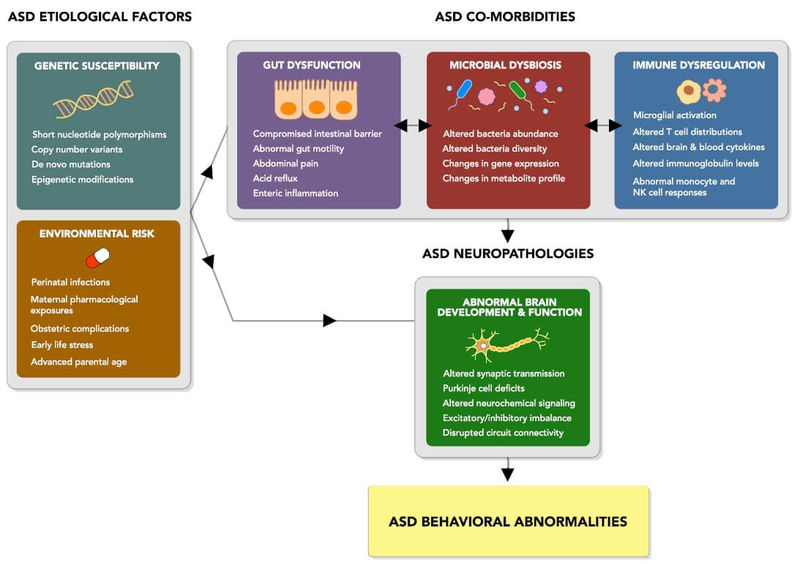
Other Conditions
Recent research in other CNS conditions associated with the gut-brain axis is summarised in Table 2.
Table 2. Other conditions influenced by the gut-brain axis
